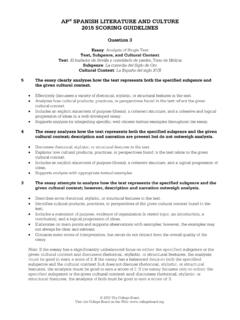Transcription of AP English Language and Composition Question 2: …
1 AP English Language and Composition Question 2: rhetorical analysis (2019) Sample Student Responses 1 The student responses in this packet were selected from the 2019 Reading and have been rescored using the new rubrics for 2020. Commentaries for each sample are provided in a separate document. Student responses have been transcribed verbatim; any errors in spelling or grammar appear as they do in the original handwritten response. AP English Language and Composition Question 2: rhetorical analysis (2019) Sample Student Responses 2 Sample PP [1] During the British occupation of India, they exerted colonial monopolies and control against the Indian people. The Indians rebelled against these monopolies, similar to the American revolution against the British. However, the movement in India was largely driven by nonviolent acts of civil disobedience, led by Mahatma Gandhi. Throughout his letter, Gandhi applies a conciliatory, yet forceful tone, he places the blame onto the British, and he continually repeats his plan for the march in order to convince the British to reverse their policies before he acts.
2 [2] Throughout his letter, Gandhi is conciliatory and respectful. He writes to the British with the intent of asking for the reversal of a law, so he knows that he must be polite and courteous. His demeanor conveys to the British his sense of servitude to the British in lines 16-20. However, he is not stepping down, but rather standing up to the British respectfully. He states that he does not seek to harm your people, which simultaneously reassures the British of nonviolence but also conveys Gandhi s sense of urgency. He is going to act, he is going to do something, and he is informing the British of it. Gandhi is not submitting; he is asserting himself, but with respect. Through his letter, he uses imperative verbs, but states them politely so to not convey a violent tone. He says, I invite you, which sounds polite, but indirectly is an order to the British to reverse their ways. He finishes his letter by reminding the British that he is not threatening them, but merely reminding them that he will act if they do not.
3 Through the letter, his tone is both respectful to the British but is also clear and forceful in its message. [3] Gandhi s rhetorical tactics place the blame onto the British. When he continually reassures them of his nonviolence, he is demonstrating that the Indians are not going to act violently, thereby indirectly asking the British if they too will follow the Indians. He uses phrases such as unless the British its steps and if the British commerce with India is purified of greed. These statements are Gandhi s way of placing responsibility on to the British. They evoke the sense that the violence and conflict are the British s fault not the Indians. In this way, Gandhi leaves it to the British to decide whether they want to stop their actions, thereby evoking a sense of guilt and responsibility in the British. These methods serve Gandhi s purpose of asking the British to revise their laws without outrightly asking. His methods make the British the aggressors and, in this way, makes the British consider their position more fully.
4 [4] By repeating his plans to march, Gandhi is showing the British that he will not make any surprises. He, from the start of the passage, informs the British of his nonviolent plans. By ensuring that the British know of his plans, he is showing a sense of responsibility and honesty in his actions. This causes the British to regard him more favorably, because they recognize that his actions and motives are clear and honest. This will serve to make them more receptive to his demands. Gandhi also describes the situation in such a way to make the British pity the Indians. He calls the tax the most iniquitous from a poor man s standpoint, and he wonders how they have submitted to the cruel monopoly for so long. By describing the situation in such terms, he gives reason for the British to pity the Indians, and again to see the harm they have caused them. These all serve to further Gandhi s case. [5] Throughout his letter to the British, Gandhi evokes a sense of imperative, yet polite force, evokes a sense of guilt in the British, and clearly states his demands.
5 He is trying to ask the British to AP English Language and Composition Question 2: rhetorical analysis (2019) Sample Student Responses 3 revise their salt act before he marches, so throughout his letter, he implores the British to consider his demands, yet still presents himself respectably and worthy of consideration. Although the letter did not work, retrospectively this letter shows the fault of the British to not accept Gandhi and furthers Gandhi s legacy as the nonviolent aggressor. This causes the British to be more respectful of Gandhi, for respect will be met with respect. Gandhi is now in a position to gain the British s favor, and now they will be more likely to accept him. AP English Language and Composition Question 2: rhetorical analysis (2019) Sample Student Responses 4 Sample SS [1] Nonviolence has often been a technique used by social and political figures to peacefully display opposition to a certain law of practice. In the book On Civil Disobedience by Henry David Thoreau, Thoreau argued that citizens must exercise their responsibility to refuse to adhere to unjust laws.
6 Later, civil rights leader Martin Luther King Jr. would take a similar approach by organizing peaceful protests to further the rights of African Americans. In 1930, Mohandas Mahatma Gandhi used the principles of civil disobedience and nonviolence to protest the unjust control of India by Britain by arranging a Salt March to display the unfair British monopoly on salt. By describing the British control of Indian commerce as greedy and misguided, clearly asserting the peaceful nature of the protest, and offering to negotiate with Viceroy Lord Irwin, Gandhi makes the case that his nonviolent protests stand up for the good of mankind against the tyranny of the British. [2] Gandhi acknowledges the risks that he is undertaking by standing up to the British government, but also asserts that they are necessary for the the victories of truth to prevail. By doing so, Gandhi is establishing an underlying theme of heroism in the face of misguided evil. This noble theme is furthered by Gandhi s desire to make the British see the wrong they have done to India, but not to harm the British.
7 Gandhi s focus on using an equal love for your people with mine serves to demonstrate the peaceful nature of his protests and also highlights the wrongdoing of the British empire by juxtaposing it with his own weapon of love and peace. Gandhi appeals to emotion, saying that the suffering of the Indian people rebelling against British rule will be enough to melt the stoniest hearts. [3] After establishing his theme of standing up to tyranny, Gandhi shifts to emphasizing the benefits that a change in British policy could bring to relations with India. Gandhi frames British control of commerce as wrong by saying that his goal is to combat such evils as the British government has enacted on India. Gandhi says that British commerce must be purified of greed, and states that after they can do so they will clearly see their own wrongdoing. This once again builds upon the foundation of the noble goal that Gandhi built in the earlier segment, because it portrays Gandhi as standing up for the rights of mankind.
8 Although Gandhi encourages the British to deal with these evils and change their ways, he also gives them an ultimatum by saying if they do not change, he will lead a nonviolent protest to disregard the provisions of the salt laws. Here Gandhi ties back his discussion to the British monopoly on salt while also asserting that he will take peaceful action to disobey the laws he deems unjust. [4] The previously established theme of heroic resistance is reiterated as Gandhi says that the independence movement is for the poorest in the land. Gandhi s reference to poverty makes the salt monopoly a social issue as well as one of commerce. Gandhi makes Indian resistance seem inevitable by questioning why they have submitted to the cruel monopoly and emphasizing how tens of thousands will protest with him. However, Gandhi continues to maintain a reasonable tone, and offers to discuss matters with Viceroy Lord Irwin if he so chooses. This is another example of Gandhi encouraging the British, represented by Lord Irwin to reflect on their actions and change their ways.
9 As the letter draws to a conclusion, Gandhi once again makes it clear that his message is not a threat, but rather an attempt to reason with the British. In the last sentence, Gandhi gives tangible evidence that some British already see the wrongness of their actions by saying the letter is being delivered by a AP English Language and Composition Question 2: rhetorical analysis (2019) Sample Student Responses 5 young English friend who believes in the Indian cause. Through this, Gandhi is giving proof that the change in British actions that he advocated for is not only possible, but already occurring. [5] Gandhi s portrayal of British control of India presents his case for Indian independence to Lord Irwin by showing it as cruel and greedy, while the resistance movement is shown as just as inevitable. Gandhi subtly weaves in implications of the heroism of nonviolence in an effort to convince the British that their domination of Indian commerce is wrong.
10 This letter is the precursor to the Salt March protest, and the eventual independence of India. AP English Language and Composition Question 2: rhetorical analysis (2019) Sample Student Responses 6 Sample HH [1] In the 1930, Indian were oppressed by the British. Britain had a monopoly on the taxation of salt. This unjust tax and control led to the rise of Mohandas Mahatma Gandhi as the leader of the Salt March. This peaceful and non-violent protest was a turning point for the civil disobedience that eventually won India its independence. However, before the march began Gandhi sent a letter to Viceroy Lord Irwin to ask him to end the salt laws before the march took place. Gandhi attempts to have Lord Irwin remove the law by merely reading his letter. [2] Gandhi establishes an equal relationship between Britain and India to convince Lord Irwin that if he would not use the law on his people then he should not place it on the Indian people. Gandhi wants to convince Lord Irwin that India is not inferior to Britain and should not be treated as if they are.















